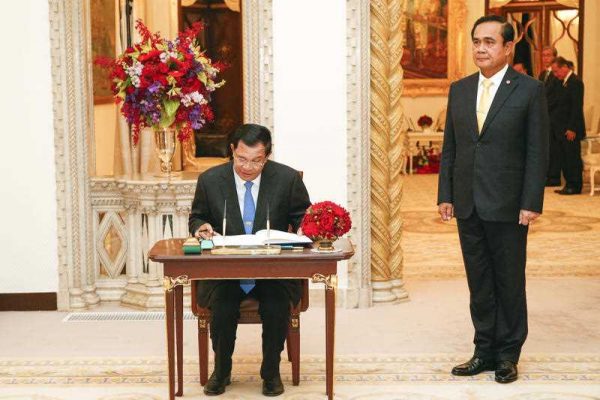Now the future looks bright. There is even speculation in the Thai press that the Thai Royal Princess Sirindorn may visit Cambodia in February.
Two key policy decisions underpin the improved bilateral ties. First, both leaders are studiously avoiding the controversial Thai–Cambodia temple dispute. Both countries continue to defer the difficult negotiations on how to implement the International Court of Justice’s 2013 judgement on demarcation of the hinterland around the Preah Vihear temple (known as Phra Viharn in Thailand).
From 2008–2011 the issue of sovereignty over the residual 4.6 square kilometres surrounding the temple brought out ugly nationalism and military hostilities in the worst intra-ASEAN dispute on record. The impact on the ASEAN security environment has been enduring, with scholar Cheunboran Chanborey arguing that the crisis rekindled Cambodia’s historic fears of Thai encroachment, pushing Cambodia into increasing alignment with China.
Second, both leaders have put economic goals at the heart of their regional policy agendas. Hun Sen wants more investment from Southeast Asia’s second-largest economy. Prayuth’s imperatives are also clear and urgent. While Thailand’s economy has recovered since 2014, when the coup stalled the economy, growth remains anaemic. The Asian Development Bank expects just 3.8 per cent GDP growth for 2016. Lower prices for farm products like rubber and rice are a continuing problem, as are the effects of China’s economic slowdown on car and disc drive sales.
In the face of a faltering economy, corruption scandals and a depressed national mood, the need for new sources of growth is pressing. The military government has decided that increasing border trade is one answer and so is pursuing rail projects linking Thailand with both China and Cambodia. In this sense, the Thai government’s economic policies closely resemble that of the Shinawatra government they overthrew. But this is not surprising given the persuasive economic logic of pursuing closer ties with Thailand’s strongly growing neighbours — such as Cambodia, Vietnam and Myanmar — and the presence of former Thaksin minister Somkit Chatusiphitak in Prayuth’s cabinet.
Still, the rapprochement faces risks going forward. The Thai media continue to closely monitor the situation at the temple and any signs of change. Thai Public Broadcasting Service reported that the Thai military has cut chains previously preventing entry into the temple environs from the Thai side. The local Thai military commander explained this was purportedly to ‘destroy a 7-year symbol of the blockage in Thai–Cambodian relations’.
For now the virulent nationalism that derailed Thai–Cambodian relations during the temple crisis remains quiescent. But the narratives of Thai territorial loss, manipulated to great political effect during the crisis in 2008, remain a latent force. Activist Veera Somkwamkid is the current nationalist thorn in the government’s attempts to rehabilitate the relationship. Veera, who was imprisoned between 2010 and 2014 in Cambodia for trespassing and espionage at the Preah Vihear temple, remains a popular figure and symbol of integrity in Thailand. Accordingly, the military government took his threat to disrupt Hun Sen’s visit seriously, dispatching soldiers to detain him at his residence during the visit.
In the longer term the Thai government will need to continue to move carefully as it begins to explore the possibility of joint exploitation of oil and gas resources in the northern Gulf of Thailand. Discussions between the respective energy ministers on pursuing mutual gains from the 27,000 square kilometre area of overlapping maritime claims were on the agenda during Hun Sen’s December visit. This was a continuation of discussions on joint maritime exploitation that began in January 2015. Recent reports suggest that the countries aim to complete a resources sharing deal for the overlapping zones in 2016. Joint exploration and exploitation would be a longer-term project to be undertaken over several years.
While Thailand can defer the demarcation of the Preah Vihear temple environs indefinitely with little cost, the same cannot be said of the overlapping maritime zones. Thailand’s appetite for energy continues to grow. Since 2010 its electricity consumption has significantly exceeded its production, with the growing gap filled by imports from Laos and Myanmar. Thailand is willing to support similar deals with Cambodia, including by investing in power line construction between the two countries.
For the time being the capacity to stifle dissent gives the Thai military government the means to push through development projects in a way the Thaksin-affiliated governments could not. But much depends on the continuing goodwill of Bangkok’s elites. Currently they still support the coup and its outcomes. Should that change, nationalism could again be manipulated for domestic political purposes with Thailand’s relations with its neighbours again suffering the fallout.
Greg Raymond is a research associate in the Strategic and Defence Studies Centre in the Coral Bell School of International Affairs at The Australian National University and a PhD candidate in the Politics Department, La Trobe University.

